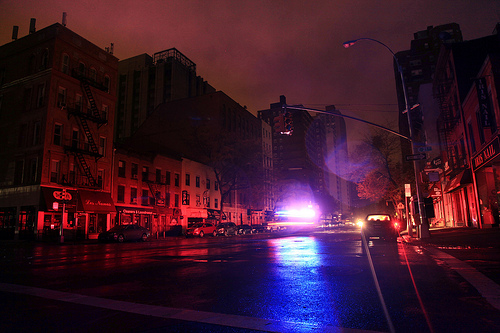
By Julia Fierro
Nicole opened the trunk of her car. She unzipped the over-stuffed economy-size duffle bags that held the iodine tablets, the “Space Emergency Blankets” and first aid kit, the whistles and toilet paper and plastic plates and utensils, the camping stove and bottles of water and nonperishable food, including twelve cans of gluten-free organic Alphabet O’s from Trader Joe’s, her son Wyatt’s favorite. She had packed changes of clothes for herself and Wyatt and even her husband Josh, although she knew how he would react if he knew.
There were a few toy cars for Wyatt, as well as his lovey, a frayed blankie named Blue, which he’d given up a just few months ago in a week of sleepless nights and tear-filled early morning waking. There were matches and flashlights and packs of batteries, and an envelope with five hundred dollars cash. And a to-go package of tampons. She had even packed a thick paperback, The Complete Works Of William Shakespeare, whose print was so small she’d need a magnifying glass. Not her ideal reading material, but still, she thought, more bang for the buck space-wise.
The NYC.gov Disaster & Preparedness Checklist list lay on top of the middle bag. She’d had the single page laminated at a drugstore, but she could see the creases where she had folded it time and time again. She felt love for this list, which had, in many anxiety-damp moments, comforted her, even if just briefly. Now, in the dim-lit driveway, she pressed it to her face and breathed deeply. The plastic cooled her panic-flushed cheeks.
She had come to see that terrible things—the witches and boogey men and homicidal maniacs of her anxiety-damp childhood—could, and did, happen during the day.
Now, Nicole’s fingers dragged over each object as if, by touch alone, they imbued her with a kind of protection. A force-field, Wyatt might say. Her sweet boy, she thought sadly, who loved superheroes and who needed to organize the world into two ranks, good guys and bad guys, and who was always asking her if so-and-so (the gruff UPS guy, the angry taxi driver) was a good guy or a bad guy.
Entwined with this feeling of safety was an acidic self-loathing. How could an intelligent person (her IQ was way above average, she thought) buy all this crap? She was a high-functioning member of society. She paid her bills on time, she held down a job, she made sure her child had all he needed to thrive, she taught literature at an elite university where her classes were among the students’ favorite. They called her Professor, she thought. The trunk of this car belonged to some militia-member of a paranoid fringe cult.
She felt like a fool when she thought of it—the end of days, like she was some right-wing evangelical. Or one of those people who believed the Mayan prediction that the world would end in 2012. But still, talk of the end was everywhere. Measles in Park Slope, mumps in Midwood. And the bees were disappearing. Nicole had heard about the bees years ago, when she was in college. Now, years later, she couldn’t stop worrying about the goddamn bees.
Armageddon. Apocalypse. By flood, by tsunami, by flaming asteroid. Shortage of water and food was inevitable, claimed even the most rational voices on NPR. The world was a mess and people were terrified; there was no denying that. Autism rates were skyrocketing, the ozone depleting, and you couldn’t eat a tuna sandwich because of the mercury.
And despite her outward nonchalance, after Wyatt was born, when all she had at stake multiplied exponentially, she had come to see that terrible things—the witches and boogey men and homicidal maniacs of her anxiety-damp childhood—could, and did, happen during the day. An airplane could slice open the sky. A pair of psychopaths could take a high school hostage. No one was ever really safe. You, yes you, could receive mail coated in white dust.
And so she had prepared, giving the same meticulous attention she had once given to the writing of her dissertation to her Go Bags. To the precious goods that she prayed would help them prevail, not perish, when and if it happened.
Julia Fierro is a novelist, editor, and the founder and director of The Sackett Street Writers’ Workshop. She recently completed a novel, The End of the World as We Know It, about the complicated and often comical experience of contemporary Brooklyn parenting. Julia is a graduate of The Iowa Writers’ Workshop, where she was a Teaching-Writing Fellow, and has taught Literature and Creative Writing in the Honors Program at Hofstra University and at the University of Iowa. She teaches the Post-MFA Writing Workshops at Sackett Street.
More End Times-themed flash fiction:

